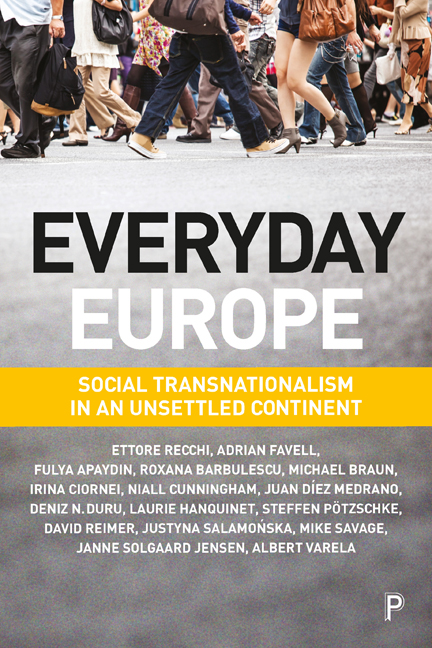Book contents
- Frontmatter
- Contents
- List of tables and figures
- Notes on contributors
- Acknowledgements
- Introduction: Social transnationalism in an unsettled continent
- one Cartographies of social transnationalism
- two The social structure of transnational practices
- three Cultural boundaries and transnational consumption patterns
- four Social transnationalism and supranational identifications
- five Explaining supranational solidarity
- six Narratives and varieties of everyday transnationalism
- seven Understanding Romanians’ cross-border mobility in Europe: movers, stayers and returnees
- eight Transnational Turkey: the everyday transnationalism and diversity of Turkish populations in Europe
- Epilogue Is social transnationalism fusing European societies into one?
- Methodological appendix
- Index
one - Cartographies of social transnationalism
Published online by Cambridge University Press: 19 April 2022
- Frontmatter
- Contents
- List of tables and figures
- Notes on contributors
- Acknowledgements
- Introduction: Social transnationalism in an unsettled continent
- one Cartographies of social transnationalism
- two The social structure of transnational practices
- three Cultural boundaries and transnational consumption patterns
- four Social transnationalism and supranational identifications
- five Explaining supranational solidarity
- six Narratives and varieties of everyday transnationalism
- seven Understanding Romanians’ cross-border mobility in Europe: movers, stayers and returnees
- eight Transnational Turkey: the everyday transnationalism and diversity of Turkish populations in Europe
- Epilogue Is social transnationalism fusing European societies into one?
- Methodological appendix
- Index
Summary
Introduction
Early globalisation theorists (Harvey 1989; Giddens 1991; Beck 2000) emphasised the significance of ‘time–space compression’ – the extent to which greater and easier mobility reduced the significance of local face-to-face ties. Others articulated a new social and spatial division between global elites and local masses (Castells 2000; Bauman 1998), a theme which rehearsed and gave new bite to the familiar distinction between sedentary ‘locals’ and mobile ‘cosmopolitans’, which had long been observed in the sociology and anthropology of community (Merton 1957; Watson 1964). These trends were also seen by sociologists embracing the mobilities turn (Urry 2000), as articulating the declining significance of borders, and fuelled the critique of ‘methodological nationalism’ which has gathered pace over the past two decades (Beck and Sznaider 2006).
This chapter recognises the power of these trends, and the extent and significance of mundane, or what we call ‘everyday’ mobilities, of people, objects and information in the contemporary world. At the same time, it seeks to direct these observations onto a more balanced terrain in which we can see how such forms of mobility allow the consolidation of distinctive territorial and social identities. This recognition also has a long history, dating back to arguments according to which globalisation led not to the eradication of the local, but to ‘glocalisation’, as global processes acted to construct new kinds of local entities (Robertson 1995). These were similar to anthropological views which claimed that globalisation allowed the proliferation of different ‘scapes’ permitting intense, particularistic identities to develop (Appadurai 1996).
It is this more nuanced and critical perspective which has come to the fore since the start of the new century, as it has become clearer that transnational practices can actually facilitate the generation of nationally specific identifications and behaviours, and even new forms of nationalism. We need to go beyond simplistic contrasts between ‘cosmopolitans’ and ‘locals’: in this case, between those who are confined to a national scale of everyday life versus those who are more international or global, in order to demonstrate the importance of a more granular geography of worldly connections.
- Type
- Chapter
- Information
- Everyday EuropeSocial Transnationalism in an Unsettled Continent, pp. 35 - 60Publisher: Bristol University PressPrint publication year: 2019



